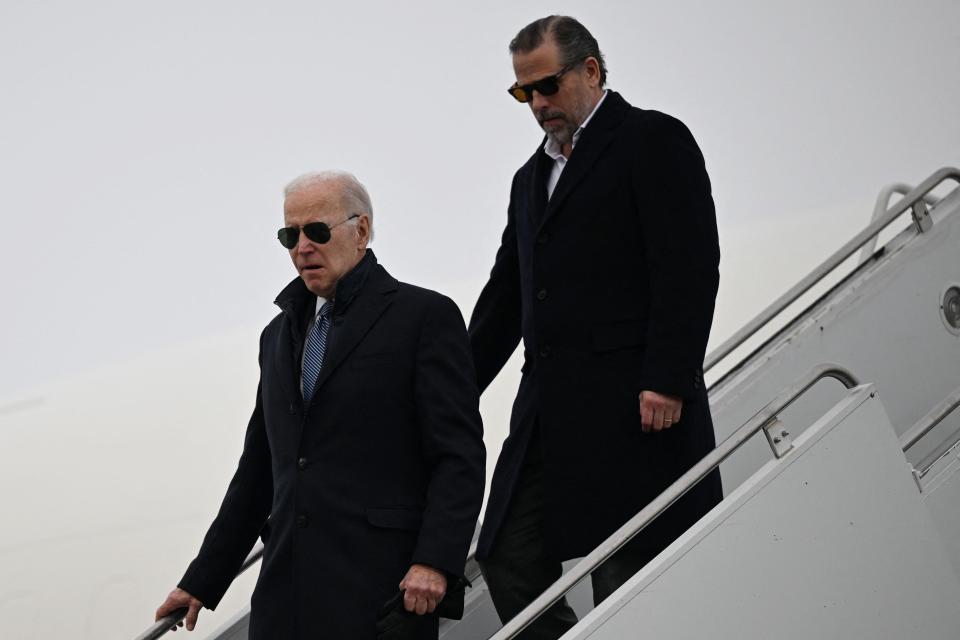What is an addict? Hunter Biden is fighting what that means as gun trial looms
Hunter Biden’s lawyers are sparring with prosecutors in his federal gun case over the definition of drug "addict," as they prepare for trial to begin June 3.
The president’s son is charged with lying on a federal form and to a gun dealer about whether he was addicted to drugs when he bought a pistol in 2018. He has acknowledged his years-long substance use in a book and interviews.
But in court filings this week, Biden’s lawyers suggested he might deny being an "addict" at the time of the purchase because he had just completed a stint in rehabilitation.
“The terms ‘user or ‘addict’ are not defined on the form and were not explained to him,” defense lawyer Abbe Lowell wrote in a filing Thursday. “Someone, like Mr. Biden who had just completed an 11-day rehabilitation program and lived with a sober companion after that, could surely believe he was not a present tense user or addict.”
Prosecutors contend Biden was an addict when buying, possessing gun
Prosecutors disagreed.
Justice Department special counsel David Weiss’s team argued in a filing Monday that Biden lied on a federal form for a background check “by falsely stating he was not an unlawful user of a controlled substance or an addict.”
The indictment charges Biden with knowingly deceiving a firearms dealer by buying a Colt Cobra 38SPL revolver on Oct. 12, 2018 and possessing it until Oct. 23, 2018. He is charged with falsely filling out a federal form denying he was an unlawful user to any narcotics. And he is charged with knowingly possessing the revolver despite the restrictions against substance users owning firearms.
The charges carry a maximum penalty of 25 years in prison, although Biden is likely to get a shorter sentence if convicted.
Trial on gun charges follows collapse of plea agreement
Weiss secured the indictment after a plea agreement fell apart in July that would have potentially kept Biden out of a jail. Judge Maryellen Noreika refused to accept the deal because of disputes between prosecutors and defense lawyers over whether it protected Biden from potential future charges. Congressional Republicans blasted the plea agreement as too lenient.
The plea bargain would have allowed Biden to enter a pretrial program for a gun charge that could have been dismissed if he complied.
The agreement would also have allowed him to plead guilty to two misdemeanors for failing to pay his taxes in 2017 and 2018. Instead, he faces a trial Sept. 5 on six federal tax charges in California.
Biden has lost appeals to dismiss both cases so prosecutors and defense lawyers continue to jockey over what evidence will be allowed at trial on gun charges.
Noreika set a pretrial conference for noon Friday.

Definition of 'addict' could be key at trial
The dispute over the definition of an addict could be a key part of the trial.
The form Biden filled out to buy the gun asked: “Are you an unlawful user of, or addicted to, marijuana or any depressant, stimulant, narcotic drug, or any other controlled substance?” Biden put an X in the “no” box.
In outlining their case, prosecutors offered quotes from Biden’s book, “Beautiful Things,” where he describes “nearly four years of active addiction” and “a half dozen rehab attempts.”
“I was a crack addict and that was that,” Biden wrote in his book. “I was doing nothing but drinking and drugging.”
Prosecutors intend to show videos and pictures from Biden’s laptop of him smoking crack or of crack or drug paraphernalia straddling the key period around the gun purchase in October 2018. In court filings, two pictures from April 27 and 28, 2018, show white material in plastic bags and a frame from a video shows Biden holding something Dec. 22, 2018.
Six videos and pictures from Biden’s laptop of him smoking crack or of crack or drug paraphernalia were submitted as exhibits. In court filings, two pictures from April 27 and 28, 2018, show white material in plastic bags and a frame from a video shows Biden holding something Dec. 22, 2018.
Prosecutors argued the judge should instruct jurors about the definition of the terms “unlawful user of a controlled substance” and “drug addict.” Prosecutors suggested using a definition from Treasury Department regulations upheld by the 8th U.S. Circuit Court of Appeals.
“The term ‘drug addict’ means any individual who habitually uses any controlled substance so as to endanger the public morals, health, safety, or welfare, or who is so far addicted to the use of a controlled substance as to have lost the power of self-control with reference to his addiction,” the regulation states.
But Biden’s lawyers argued against the Treasury definition because he interpreted the question on the form as asking if he were an addict at the time he bought the gun.
A 3rd U.S. Circuit Court of Appeals decision in a gun possession case required a defendant “to have engaged in regular use” of narcotics that was “contemporaneous with possession of the firearm.” The appeals court overturned a conviction in the case where a defendant had used marijuana six hours before he was found in possession of a gun.
“There is no more reason to prohibit gun possession by people who are not intoxicated, simply because they may get intoxicated when they are not physically possessing a gun,” Lowell wrote. “A gun owner who leaves their guns behind when they head to the bar for a drink or locks their gun in a lockbox or safe while using marijuana (or taking a legally prescribed Oxycontin) is being responsible and should not be treated like a felon.”
This article originally appeared on USA TODAY: Hunter Biden, prosecutors dispute what 'addict' means before gun trial
